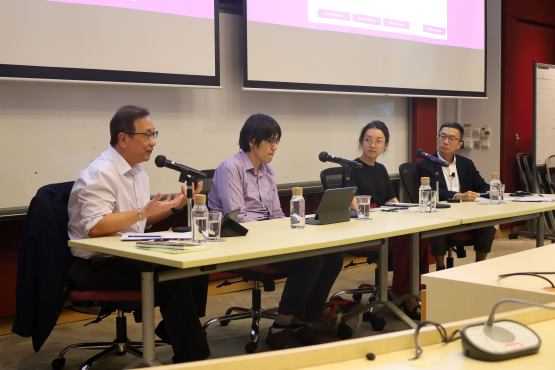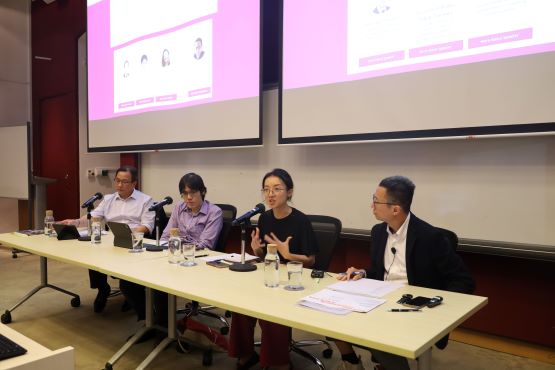.png?sfvrsn=fca4340a_0)
The Social Inclusion Project (SIP) is a research programme dedicated to analysing the role of public policies in creating an open, diverse and inclusive society, where people have opportunities for participation. Its activities aim to influence policy development, promote policy literacy and enable engagement. The SIP is committed to independent and transparent research on overlooked and emerging social problems, with a focus on empirical work with practical impact.
The annual Budget is a major policy event setting out the government’s priorities and plan of action for the coming fiscal year. It carries the weight of our collective commitment towards meeting challenges in our society: how to promote economic vibrancy, social inclusion and environmental sustainability.
This panel discussion, hosted by the
Social Inclusion Project, just a few days after the 2023 Budget announcement, brought together experts to decode and discuss this year’s Budget. The event started with a round of comments from each panellist. This was followed by a question-and-answer session, led by questions from the chairperson Dr Ng Kok Hoe, Senior Research Fellow and Head of the Social Inclusion Project, and then questions from the audience.

Housing: affordability and accessibility
Professor Sing Tien Foo, Provost’s Chair Professor in the Department of Real Estate at NUS, made a key distinction between housing
affordability and
accessibility.
Affordability refers to changes in prices, an issue that has recently captured public attention. He noted that the younger generation is concerned about housing prices. There have been up to 20 per cent increases in flat prices, the highest since the last price peak in 2013.
While government subsidies like those announced at Budget 2023 can help with rising prices,
accessibility is the bigger issue. Many factors play into whether a flat is accessible or not: long waiting times and choice of location, for example. Among those who apply for a flat in mature estates, there is one successful applicant for 90 unsuccessful ones. Matching expectations can be difficult. Prof Sing raised the question of how we can bridge the gap between supply and demand given current backlogs and construction delays. He had discussed some of these issues in an earlier
commentary.
Housing is not just about a roof over one’s head but has social implications too. The additional benefits provided in this year’s Budget to young families below the age of 40 is one example. Prof Sing highlighted this in line with the government’s intention to encourage family formation. Only time will tell, however, whether housing support for young couples does in fact help with the fertility rate, which dropped to a new low in 2022.
During the question-and-answer session, it was emphasised that comparing housing prices across societies may not always be helpful and it is important to note differences in contexts. For example, while housing in Singapore may be more affordable than other places, those societies may be subsidising public services like healthcare and childcare. Affordability must be assessed based on the full range of public services for meeting basic needs. The uniqueness of Singaporean housing policy is also that owner-occupied public housing dominates the housing landscape, while subsidised social housing is severely limited.
Economics: job security amidst uncertainty
Associate Professor of Economics at the Singapore University of Social Sciences and former Nominated Member of Parliament Walter Theseira described this year’s Budget as one of
transition, for several reasons. First,
transition of leadership: this is the first Budget since the People’s Action Party announced their new leader and the likely future Prime Minister, Lawrence Wong - who himself delivered the Budget. At the same time, Singapore is facing a
transition out of COVID-19 and simultaneously a
transition away from globalisation. COVID-19’s impact on global supply chains; resource scarcities; uncertain US-China relations; and Russia’s war on Ukraine have triggered global economic recession, inflation and disruptions to labour migration.
No single Budget can solve all these issues. A mix of measures to deal with immediate issues and policies to address long-term pressures are needed. While the GST and CDC vouchers help to insulate low-income groups from rising costs, the Progressive Wage Model tackles persistent problems in wage distribution.
Prof. Theseira also noted the lack of unemployment insurance in Singapore. Given the uncertainties faced by the middle class, a more comprehensive social security net could reduce financial insecurity and allow judicious risk-taking.
Skills development and job matching also have a part to play. It is important to track policy outcomes and what works. For older workers, age discrimination remains an issue. Many older Singaporeans are also unable to take on simple office jobs and instead are forced to do low-wage manual work due to language barriers.

Climate change: building resilience for the future
Ms Qiyun Woo, environmental activist and Sustainability Consultant at Unravel Carbon, noted that amidst the current economic pressures, many see the climate crisis as a secondary consideration. To move forward and build resilience, she argued that accounting for climate change is key.
Ms Woo highlighted several environment-related measures that had been put in place in recent years. Following road tax rebates and diesel duty announcements in 2019, climate targets were updated in 2020, along with early adoption initiatives for electrical vehicles and flood prevention measures, to name a few. In 2021, the New Green Plan was announced to provide more funding for research and carbon tax was raised. This momentum continued in 2022 with electricity rebates and an emissions framework for exposed sectors. Therefore, it came as a surprise that in the 2023 Budget, there was little attention to climate change.
Efforts to decarbonise, conserve and transition sustainably need to go further. More needs to be done to build the population’s climate literacy – be it through formal education in schools or educating older members of our population. Behavioural changes to support environmentally friendly practices must be information driven. During the question-and-answer session, one audience member suggested that we need to seriously consider new paradigms when pursuing green growth, including “putting a knife to some parts of the economy”.
Climate change is not a separate crisis
– it is a concurrent and compounding one to the other crises in the world. Animals are now in sufficient proximity to pass diseases to humans – take COVID-19 and dengue as examples. Weather patterns are changing and those working manual jobs are often most prone to heat insecurity.
The 2023 Budget arrives during a period when Singapore and its people are grappling with uncertainties and challenges in a world emerging from the pandemic. Across the various themes explored during this panel discussion, the insights gave everyone something to think about. The
Social Inclusion Project looks forward to hosting more of these important conversations.